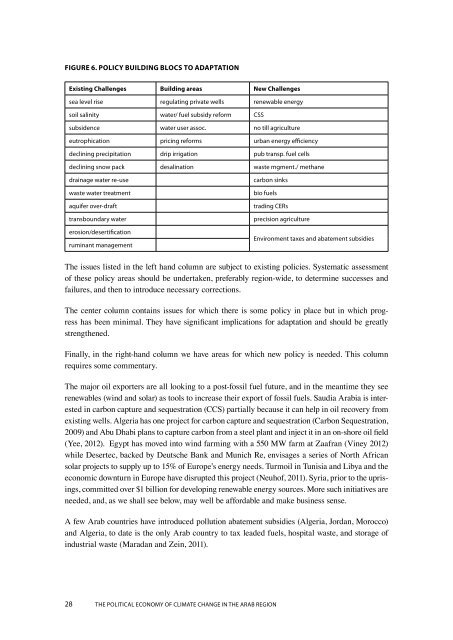The Political Economy of Climate Change in Arab Countries
The Political Economy of Climate Change in Arab Countries
The Political Economy of Climate Change in Arab Countries
Create successful ePaper yourself
Turn your PDF publications into a flip-book with our unique Google optimized e-Paper software.
Figure 6. Policy Build<strong>in</strong>g Blocs to AdaptationExist<strong>in</strong>g Challenges Build<strong>in</strong>g areas New Challengessea level rise regulat<strong>in</strong>g private wells renewable energysoil sal<strong>in</strong>ity water/ fuel subsidy reform CSSsubsidence water user assoc. no till agricultureeutrophication pric<strong>in</strong>g reforms urban energy efficiencydecl<strong>in</strong><strong>in</strong>g precipitation drip irrigation pub transp. fuel cellsdecl<strong>in</strong><strong>in</strong>g snow pack desal<strong>in</strong>ation waste mgment./ methanedra<strong>in</strong>age water re-usewaste water treatmentaquifer over-drafttransboundary watererosion/desertificationrum<strong>in</strong>ant managementcarbon s<strong>in</strong>ksbio fuelstrad<strong>in</strong>g CERsprecision agricultureEnvironment taxes and abatement subsidies<strong>The</strong> issues listed <strong>in</strong> the left hand column are subject to exist<strong>in</strong>g policies. Systematic assessment<strong>of</strong> these policy areas should be undertaken, preferably region-wide, to determ<strong>in</strong>e successes andfailures, and then to <strong>in</strong>troduce necessary corrections.<strong>The</strong> center column conta<strong>in</strong>s issues for which there is some policy <strong>in</strong> place but <strong>in</strong> which progresshas been m<strong>in</strong>imal. <strong>The</strong>y have significant implications for adaptation and should be greatlystrengthened.F<strong>in</strong>ally, <strong>in</strong> the right-hand column we have areas for which new policy is needed. This columnrequires some commentary.<strong>The</strong> major oil exporters are all look<strong>in</strong>g to a post-fossil fuel future, and <strong>in</strong> the meantime they seerenewables (w<strong>in</strong>d and solar) as tools to <strong>in</strong>crease their export <strong>of</strong> fossil fuels. Saudia <strong>Arab</strong>ia is <strong>in</strong>terested<strong>in</strong> carbon capture and sequestration (CCS) partially because it can help <strong>in</strong> oil recovery fromexist<strong>in</strong>g wells. Algeria has one project for carbon capture and sequestration (Carbon Sequestration,2009) and Abu Dhabi plans to capture carbon from a steel plant and <strong>in</strong>ject it <strong>in</strong> an on-shore oil field(Yee, 2012). Egypt has moved <strong>in</strong>to w<strong>in</strong>d farm<strong>in</strong>g with a 550 MW farm at Zaafran (V<strong>in</strong>ey 2012)while Desertec, backed by Deutsche Bank and Munich Re, envisages a series <strong>of</strong> North Africansolar projects to supply up to 15% <strong>of</strong> Europe’s energy needs. Turmoil <strong>in</strong> Tunisia and Libya and theeconomic downturn <strong>in</strong> Europe have disrupted this project (Neuh<strong>of</strong>, 2011). Syria, prior to the upris<strong>in</strong>gs,committed over $1 billion for develop<strong>in</strong>g renewable energy sources. More such <strong>in</strong>itiatives areneeded, and, as we shall see below, may well be affordable and make bus<strong>in</strong>ess sense.A few <strong>Arab</strong> countries have <strong>in</strong>troduced pollution abatement subsidies (Algeria, Jordan, Morocco)and Algeria, to date is the only <strong>Arab</strong> country to tax leaded fuels, hospital waste, and storage <strong>of</strong><strong>in</strong>dustrial waste (Maradan and Ze<strong>in</strong>, 2011).28 THE POLITICAL ECONOMY OF CLIMATE CHANGE IN THE ARAB REGION
















